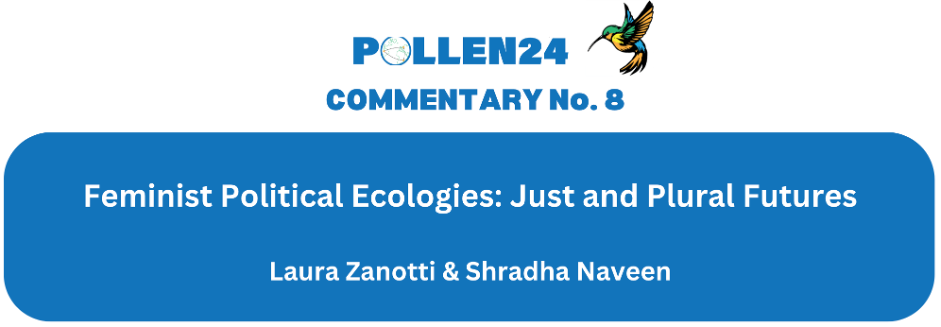2024-05-07
Feminist Political Ecologies: Just and Plural Futures

Abstract
Feminist Political Ecologies: Just and Plural Futures
For a feminist political ecology in the twenty-first century, attentiveness to normative and radical epistemologies in late liberal capitalism (Lundberg et al., 2023), racialized legacies of place (Mollet, 2015), resurgence and abundance (Fujikane, 2021), and the modes and mediums in which we engage in praxis and healing are critical (Zargocin and Caretta, 2021; Hernandez, 2022). As Julie Sze (2018:15) implores, reflexive interdisciplinary research, taking seriously cultural values, and investing in situated practices that prioritize the convergence of “academic fields, research and practice, and campuses and communities” … for “new vocabularies and approaches” should buoy and shape not only research designs but how we hold space in our collective work. These calls to action are stark reminders of the inescapable new relations with more than humans in disturbed landscapes (Tsing 2015) as well as the plural and multi-sited political ecologies that are necessary to weave together (Leff, 2003; Escobar, 2011; Torre, 2020). In constellation with such work, policymakers, leaders from Indigenous and Local communities, scholars, artists, and activists identify new tipping points and design approaches that uphold futures that are not based on extraction, oppression, and violence but on care and hope.
Feminist political ecological work is the center of such analysis, engagement, and action. As dominant theoretical frameworks within the “human-environmental” nexus prioritize systems of systems approaches, political ecology’s critical approaches remain its strength, where attentiveness to epistemological and ontological foundations and the steady focus on power remains. Power is central to analyses of “environmental” issues at various scales, providing a toolkit to explore how top-down intersects with intersectional identities and cultural practices (Rocheleau, 2008; Sultana, 2021). In contrast, dominant analytical frameworks often fall into the traps of normative narratives that fail to consider epistemic plurality and culturally diverse perspectives (Zanotti et al., 2020). In this way, political ecologists have taken up theoretical questions that open up possibilities for exploring multispecies relations, justice, and worlds (Celermajer et al., 2022; Price and Chao, 2023), consider the affective dimensions of belonging, embodiment, loss, and healing (Allen, 2020; González-Hidalgo and Zografos, 2020) and confront systemic racism entrenched in society and the academy (Heynen, 2016). Both the porosity and generosity of the approach (Robbins, 2019) accommodate inquiries into new fields of scalar praxis that interpellated worlds within worlds, whether in media ecologies and infrastructures, new glacial politics, sustainability and AI, reproductive health, or extreme weather responses.
Feminist political ecology, though, could do better to (1) enact anti-colonizing and decanonizing politics in research and in the academy more broadly, (2) intensify work to augment the critical importance of Indigenous and Local Knowledges, and (3) transform methodological praxis. In particular, feminist political ecology scholars have engaged with anti-colonial, post-colonial, and decolonial approaches to what is taken for granted in leading discourses, policies, and practices on environment and development (Maldonado-Torres, 2016). Moreover, Liboroin (2021) invites us to question the settler colonial logics that serve as the underlying foundations of late liberalism and petrocapitalism. Addressing colonialism as an ongoing process within which the present day is considered already dystopian (Tuck and Yang, 2012; Whyte, 2018), these works make visible the often hidden distributional, epidemiological, psychosocial, and biophysical effects of settler colonial processes based on theft and extractivism and propose theoretical and methodological replacements to settler colonial academic practices.
Kyle Whyte (2018:126) for example proposes the concept of “collective continuance” to replace discussions on social resilience to show “vicious sedimentation” and “insidious loops” of settler colonial environmental injustice. Whyte defines (2018:131) collective continuance as “a society’s capacity to self-determine how to adapt to change in ways that avoid reasonably preventable harms.” Whyte’s work is one of many that are reclaiming theoretical space to contribute to already flourishing work on Indigenous and Indigenizing research methodologies while at the same time inviting us to revisit concepts and processes and make visible settler colonial “toxic geographies” within political ecological worlds (Nunn, 2018).
Work should not, though, simply focus on marginality and vulnerability, reproducing crisis narratives. Political ecologists are poised to weave new storylines – ones based on “courage, respect, justice, equality, and reciprocity.” (Maldonado and Lazrus, 2019: 34). Emerging trends in embodied, multisensorial, multimodal, and art-based collective praxis are fruitful arenas for engagement and expansion (Todd, 2015; Harcourt, 2019). Feminist political ecological approaches and efforts to suggest that radical collaboration – partnering – not in “co-production” with but in “co-relation” with communities, interlocuters, actants, and communities – is necessary to do the critical work that is in service to survivability, joy, and resistance.
Sensory and multimodal methods bring heightened focus to capturing the diverse nonverbal “discursive modalities” of these sites and the ways they are produced: “visual images, nonverbal communication, architecture, and the built environment” (Jaworksi and Thurlow, 2010:1). For example, within cultural geography, Viannini (2015:318) suggests “non-representational research seeks to cultivate an affinity for the analysis of events, practices, assemblages, affective atmospheres, and the backgrounds of everyday life against which relations unfold in their myriad potentials.” Drawing from visual anthropological traditions, Nakamura (2013:133) outlines two approaches to sensory ethnography. The first, the aesthetic-sensual emphasizes “emotional states through vivid aesthetic-sensual immersion”, and secondly, suggests drawing from phenomenology emphasizes “multisensory-experiential data (vision, taste, hearing, smell, touch, etc.).” Visual and sensory work can provide a material context for apprehending the meanings and relations behind power-laden human and more than human interactions - mapping that represents the visible/invisible materialities, technologies, and infrastructures as well as draws into focus the various ways in which power pulses through political economies and local landscapes (Mosse, 2003: 208).
Such responsive approaches embody respectful, transparent commitments to celebrate strength and center trust and respect (Svarstad, 2020; Neely and Lopez, 2022). This requires a deep and radical transformation of disciplinary practices, politicizing the production of knowledge, reevaluating who is considered knowledge holders, and prioritizing research that is empirical and substantively engages with sovereignty and self-determination. This means centering the voices and lived experiences of scholars, activists, artists, and Local and Indigenous communities from the Global South and deeply engaging with them as knowledge producers and holders as they theorize and develop our radical futures.
Notes
[1] Laura Zanotti is a Professor in the Department of Anthropology at Purdue University and President-Elect of SALSA. For twenty years, she has partnered with the Mebêngôkre-Kayapó Peoples on projects centered on land rights and sovereignty, sustainable energy, and self-determination in a digital age. ORCiD: 0000-0003-2712-4284. Work was supported by the Purdue College of Liberal Arts Global Synergy Grant. We thank Gandhigram Trust and Best Practices Foundation for trusting, collaborating and opening up spaces for me. We acknowledge the traditional homelands of the Indigenous Peoples which Purdue University is built upon. I honor and recognize the Bodéwadmik (Potawatomi),Kiikaapoi (Kickapoo) Lenape (Delaware), Myaamia (Miami), and Shawnee Peoples who are the original Indigenous caretakers.
[2] Shradha Naveen is a PhD candidate in Purdue University’s Department of Anthropology. Her research interests lie at the intersection between cultural and environmental anthropology. She is currently doing her field research in South India looking at ‘rural water experiences’ in the Kaveri Watershed.
References
Allen, I. K. (2020). Thinking with a Feminist Political Ecology of Air-and-breathing-bodies. Body & Society, 26(2), 79-105. https://doi.org/10.1177/1357034X19900526
Celermajer, D., Schlosberg, D., Rickards, L., Stewart-Harawira, M., Thaler, M., Tschakert, P., ... & Winter, C. (2022). Multispecies justice: theories, challenges, and a research agenda for environmental politics. Trajectories in Environmental Politics, 116-137. https://doi.org/10.1080/09644016.2020.1827608
Escobar, A. (2011). Ecología política de la globalidad y la diferencia. La naturaleza colonizada. Ecología política y minería en América Latina, 1, 61-92.
Fujikane, C. (2021). Mapping abundance for a planetary future: Kanaka Maoli and critical settler cartographies in Hawai'i. Duke University Press.
González-Hidalgo, M., & Zografos, C. (2020). Emotions, power, and environmental conflict: Expanding the ‘emotional turn’in political ecology. Progress in Human Geography, 44(2), 235-255. https://doi.org/10.1177/0309132518824644
Harcourt, W. (2019). Feminist political ecology practices of worlding. International Journal of the Commons, 13(1), 153-174. DOI: 10.18352/ijc.929
Hernandez, J. (2022). Fresh banana leaves: Healing Indigenous landscapes through Indigenous science. Berkeley, CA: North Atlantic Books.
Heynen, N. (2016). Urban political ecology II: The abolitionist century. Progress in Human Geography, 40(6), 839-845. https://doi.org/10.1177/0309132515617394
Leff, E. (2003). La ecología política en América Latina. Un campo en construcción. Polis. Revista Latinoamericana, (5). URL: http://journals.openedition.org/polis/6871
Liboiron, M. (2021). Pollution is colonialism. Durham: Duke University Press.
Lundberg, A., Chao, S., Benedito Ferrão, R., Sinamai, A., Okpadah, S., Regis, H. and Gregory Luke, C. (2023) Decolonizing the Tropics : Part One. eTropic: electronic journal of studies in the Tropics, 22 (1). pp. 1-28. doi:10.25120/etropic.22.1.2023 ISSN 1448-2940.
Maldonado, J., & Lazrus, H. (2019). A story of “rising voices” and intercultural collaboration. Practicing Anthropology, 41(3), 34-37. https://doi.org/10.17730/0888-4552.41.3.34
Maldonado-Torres, N. (2016). Colonialism, neocolonial, internal colonialism, the postcolonial, coloniality, and decoloniality. In Critical terms in Caribbean and Latin American thought: Historical and institutional trajectories (pp. 67-78). New York: Palgrave Macmillan US.
Mollett, S. (2015). “Displaced futures”: indigeneity, land struggle, and mothering in Honduras. Politics, Groups, and Identities, 3(4), 678-683. https://doi.org/10.1080/21565503.2015.1080620
Mosse, D. (2003). The rule of water: statecraft, ecology and collective action in south India. Oxford University Press.
Nakamura, K. (2013). Making sense of sensory ethnography: The sensual and the multisensory. American Anthropologist, 115(1), 132-135. https://www.jstor.org/stable/24028709
Neely, A. H., & Lopez, P. J. (2022). Toward healthier futures in post‐pandemic times: Political ecology, racial capitalism, and black feminist approaches to care. Geography Compass, 16(2), e12609. https://doi.org/10.1111/gec3.12609
Nunn, N. (2018). Toxic encounters, settler logics of elimination, and the future of a continent. Antipode, 50(5), 1330-1348. https://doi.org/10.1111/anti.12403
Price, C., & Chao, S. (2023). Multispecies, More-Than-Human, Nonhuman, Other-Than-Human: Reimagining idioms of animacy in an age of planetary unmaking. Exchanges: The Interdisciplinary Research Journal, 10(2), 177-193. https://doi.org/10.31273/eirj.v10i2.1166
Robbins, P. (2019). Political ecology: A critical introduction. New York: John Wiley & Sons.Rocheleau, D. E. (2008). Political ecology in the key of policy: From chains of explanation to webs of relation. Geoforum, 39(2), 716-727. https://doi.org/10.1016/j.geoforum.2007.02.005
Sultana, F. (2021). Political ecology 1: From margins to center. Progress in Human Geography, 45(1), 156-165. https://doi.org/10.1177/030913252093675
Svarstad, H., & Benjaminsen, T. A. (2020). Reading radical environmental justice through a political ecology lens. Geoforum, 108, 1-11. https://doi.org/10.1016/j.geoforum.2019.11.007
Sze, J. (Ed.). (2018). Sustainability: Approaches to environmental justice and social power. New York: NYU Press.
Todd, Z. (2015). Indigenizing the anthropocene. Art in the Anthropocene: Encounters among aesthetics, politics, environments and epistemologies, 241-54.
Torre, S. (2020). Il metodo del vivente. L’ecologia politica e la rielaborazione del discorso geografico. Geography Notebooks, 3(2), 201-215.
Tuck, E. and K. Wayne Yang. (2012). Decolonialization is not a metaphor. DecolonizationL Indigenity, Education & Society, 1(1), 1-40.
Tsing, A. L. (2015). The mushroom at the end of the world: on the possibility of life in capitalist ruins. Princeton, NJ: Princeton University Press. https://doi.org/10.1515/9781400873548
Whyte, K. (2018). Settler colonialism, ecology, and environmental injustice. Environment and Society, 9(1), 125-144. https://doi.org/10.3167/ares.2018.090109
Zanotti, L., Ma, Z., Johnson, J. L., Johnson, D. R., Yu, D. J., Burnham, M., & Carothers, C. (2020). Sustainability, resilience, adaptation, and transformation: tensions and plural approaches. Ecology and Society, 25(3).
Zaragocin, S., and Caretta, M. A. (2021). Cuerpo-territorio: A decolonial feminist geographical method for the study of embodiment. Annals of the American Association of Geographers, 111(5), 1503-1518. https://doi.org/10.1080/24694452.2020.1812370
